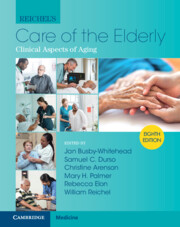Book contents
- Reichel’s Care of the Elderly
- Reichel’s Care of the Elderly
- Copyright page
- In Memoriam
- Contents
- Contributors
- Section I General Approach to the Care of the Elderly
- Chapter 1 Essential Principles in the Care of the Elderly
- Chapter 2 Biology of Aging
- Chapter 3 Comprehensive Geriatric Assessment
- Chapter 4 Screening and Prevention
- Chapter 5 Appropriate Use of Medications
- Chapter 6 Nutrition and Aging
- Chapter 7 Physical Activity and Exercise for Older Adults
- Section II Geriatric Syndromes
- Section III Care of the Elderly by Organ System
- Section IV Principles of Care for the Elderly
- Index
- Plate Section (PDF Only)
- References
Chapter 2 - Biology of Aging
from Section I - General Approach to the Care of the Elderly
Published online by Cambridge University Press: 30 June 2022
- Reichel’s Care of the Elderly
- Reichel’s Care of the Elderly
- Copyright page
- In Memoriam
- Contents
- Contributors
- Section I General Approach to the Care of the Elderly
- Chapter 1 Essential Principles in the Care of the Elderly
- Chapter 2 Biology of Aging
- Chapter 3 Comprehensive Geriatric Assessment
- Chapter 4 Screening and Prevention
- Chapter 5 Appropriate Use of Medications
- Chapter 6 Nutrition and Aging
- Chapter 7 Physical Activity and Exercise for Older Adults
- Section II Geriatric Syndromes
- Section III Care of the Elderly by Organ System
- Section IV Principles of Care for the Elderly
- Index
- Plate Section (PDF Only)
- References
Summary
Exciting advances have been made recently in understanding the mechanistic underpinnings of aging. Mounting evidence suggests that progression of aging changes can be modulated. Interventions that extend health span and lifespan in model organisms have been developed. The time is approaching for translation of these interventions into clinical treatments. By targeting fundamental aging mechanisms, it may be possible to delay, prevent, or alleviate chronic diseases as a group, rather than individually, and enhance health span. Such a compression of morbidity would have profound clinical and economic benefits, with reductions in life-years spent with chronic disease and age-related dysfunction. However, barriers remain, including lack of clinical and regulatory paradigms for translating agents that target fundamental aging processes into clinical interventions, and a shortage of personnel trained to do so. Here we consider research findings that support the potential value of translational aging research and strategies to move these findings from bench to bedside.
- Type
- Chapter
- Information
- Reichel's Care of the ElderlyClinical Aspects of Aging, pp. 12 - 20Publisher: Cambridge University PressPrint publication year: 2022

